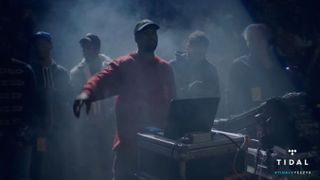Like it or not, Tidal needs more Kanye Wests
Opinion: Kanye's stream was great - now Tidal needs to do it again

Well folks, Kanye West's Tidal livestream of his new album/new fashion line/new video game announcement is in the books. And what a gloriously random event it was.
While the occasion, fed live from Madison Square Garden, was a captivating one, what makes it more noteworthy was that it was streamed to whoever wanted to watch it by Tidal, a small-ish music streaming service owned by Kanye pal Jay Z.
And after witnessing the spectacle, it seems like more high-profile, non-exclusive events like this could be exactly what Tidal needs.
To catch up those of you who might not have been on Twitter this week, the event centered on Kanye West debuting his latest fashion line, Yeezy Season 3, along with a stream of his new album, The Life of Pablo. And as a completely unexpected surprise, he also revealed he's working on a video game called Only One, which basically depicts his mother going to heaven. Yeah, random.
Personally, this wasn't for me - I don't really care much for the new fashion line, and while his new album definitely has some catchy tunes, I'm more of a classic Kanye guy.
But the buzz around the happenings and the fact I didn't have to sign up for Tidal to watch it all go down turned me on to what the service is capable of.
Do it for the exposure
Tidal has had a rough time ever since it started, and many critics have outright called it a flop. Its premise is that while it charges a little extra ($19.99, £19.99, AU$23.99 per month) compared to other streaming services for its "HiFi" sound (and so it can pay higher royalties to musicians and songwriters), it offers a better audio quality for those that want it.
Get daily insight, inspiration and deals in your inbox
Get the hottest deals available in your inbox plus news, reviews, opinion, analysis and more from the TechRadar team.
Consumers, however, haven't really been willing to pay extra for better audio quality. Not only that, but while Tidal also offers a standard, non-high quality service at $9.99 (£9.99, AU$11.99) a month, there are plenty of people who don't even know what Tidal is.
Enter Kanye West.
Tidal has streamed plenty of concerts before, but those have almost all been available exclusively to Tidal subscribers. When Kanye announced his fashion show/album listening party was going down, he was quick to stress that anyone with an internet connection could check it out for themselves - no subscription required. The result? A whopping 20 million people tuned into Yeezy 3, meaning that many who may not have heard of Tidal before this week are now exposed to it.
It's an amazing figure, and should serve as a wake up call for executives over at Tidal. Sure, providing concerts to subscribers is a nice perk, but if it can afford to open mega streaming events up to all, it absolutely should. They just might convince some people that signing up is worth it.
Different from the rest
Worldwide listening parties like Kanye's can also help differentiate the service from others on the market.
Really the only comparable service in terms of exclusive content is Apple Music, which offers a great radio station, Beats 1, as well as radio shows with celebrities like Pharrell Williams and Jaden Smith. Others, like Spotify and Google Play Music, have a great service, but they don't really give anything in the way of extras.
This is especially true of such high-profile releases as that of a new Kanye West album. Tidal is in a unique position: owned by Jay Z, a man that has connections all over the music industry. Really the only other company that can claim this is, again, Apple Music, which has its origins in Beats Music, started by legendary music executive Jimmy Iovine and equally legendary music producer Dr. Dre.
Jay Z could not only use his incredible clout to bring in big-name artists, but also to show audiences "who's next," holding open-to-all streams for unknown artists and exposing a larger audience to them. He could use his celebrity and his platform for musical good, not just hyping up an already (too?) famous rapper.
Christian is a writer who's covered technology for many years, for sites including Tom's Guide, Android Central, iMore, CNN, Business Insider and BGR, as well as TechRadar.
Most Popular

